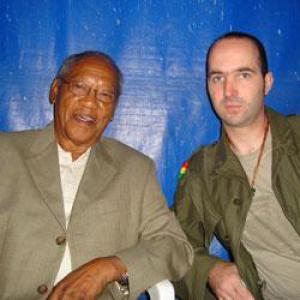The list of remaining Jamaican Music legends is shortened every year. When we heard the Helden In Het Park festival managed to book guitar legend Ernest Ranglin, we didn't hesitate for a minute. The concert, backed by the superb High Notes from Holland, was a success even before the first note was played and the conversation we had with Ernest afterwards - a bit like listening to your grandfather telling stories - was just the icing on the cake.
Ernest, you already started to play the ukulele when you were still a little boy; would you say you were kind of genetically predestined for a career as a musician?
Ernest Ranglin: "I think so, yes. I also had a couple of uncles who played the ukulele and the guitar. In the beginning I just played by ear, but I really started to teach myself around the age of fourteen."
Did you get any kind of schooling, a musical education?
Ernest Ranglin: "No, I'm completely self-taught."
You were also at the root of ska music, your song ‘Shuffling Bug' being considered as one of, if not the earliest ska tune, but you're also well-known as a jazz musician. How different are these two genres or do they have similarities?
Ernest Ranglin: "In my opinion they are a million miles apart, but I did my best to bring the two closer together and amalgamate both styles. That has really been my life's work: bringing styles and rhythms together and making the mix work."
Was the evolution to the then new ska sound a gradual thing or did it happen quite suddenly?
Ernest Ranglin: "Well, I might have recorded that song, but it wasn't a one man thing. I was just a musician, but you also had Coxsone Dodd, who had an amazing ear for music and rhythm. I remember we got together one day with Cluett Johnson, who was the bass player I worked with, and came up with this new pattern. A lot of tunes of Clue J And The Blues Blasters were really my compositions, but at that time ska music wasn't really regarded that well yet, it was underground music, so I didn't connect my name to them as I was already doing very well as a jazz musician."
As your main influence you always site a man called Charlie Christian (American swing and bebop jazz guitarist. Christian was an important early performer on the electric guitar, and is cited as a key figure in the development of bebop, red.). Who was he exactly?
Ernest Ranglin: "Charlie was the first guitarist who really played his guitar as a solo instrument. Apart from him I would recommend you also listen to the work of Benny Goodman (born Benjamin David Goodman, Benny Goodman was an American jazz musician, clarinettist and bandleader, known as ‘King of Swing', 'Patriarch of the Clarinet', 'The Professor' and 'Swing's Senior Statesman', red.) and Lionel Hampton (American jazz vibraphonist, pianist, percussionist, bandleader and actor. As one of the first jazz vibraphone players, Hampton ranks among the great names in jazz history, having worked with a who's who of jazz musicians, from Benny Goodman and Buddy Rich to Charlie Parker and Quincy Jones, red.). That's really the era of music that influenced me the most."
Your first single was the first 7inch to be produced by a then still young Chris Blackwell when he started his Island Records label and many years later he signed you once again on Palm Pictures. How would you describe your relationship with Chris?
Ernest Ranglin: "We've been good friends for many many years now. Among the many things we did together was also 'My Boy Lollipop' which became a big hit for Millie Small. That was the tune that really launched Chris as a producer."
What exactly was your involvement in the creation of that song?
Ernest Ranglin: "I did not compose that track, but I arranged and directed the music for it. I was the first guy who made English musicians play ska music; at that time that was strictly a Jamaican thing."
More recently you did the 'In Search Of The Lost Riddim' album, where you collaborated with various African artists. Was that project a dream come true?
Ernest Ranglin: "Well, in part at least, yes. I came to Senegal for the first time in 1976 and I got really fascinated with all the sounds and rhythms over there. When I had to leave I wished I could return there one day to work with these local musicians. When I returned so many years later it was really Baaba Maal who put me in contact with all the other musicians, so I have to express my thanks for that."
In the course of your career, which spans several decades now, did you always use the same brand of guitar?
Ernest Ranglin: "No, not at all, I've played all kinds of guitars over the years, but I do have to admit that I love to play a big-sized guitar. It just feels better in my hands, but that's not always easy to travel with, so sometimes I just have to make do with the smaller ones they give me. (laughs)"
In conclusion, in just a few words, who is Ernest Ranglin?
Ernest Ranglin: "Ernie Ranglin? I don't really know what to say about that guy, but I think he's definitely a loving person. He's also someone who loves nature and nature is music, because in the beginning was the word and the word was vibrated, meaning sound was created and music is just vibrating sound, so what I do is to try and live in the realm of good vibrations!"


